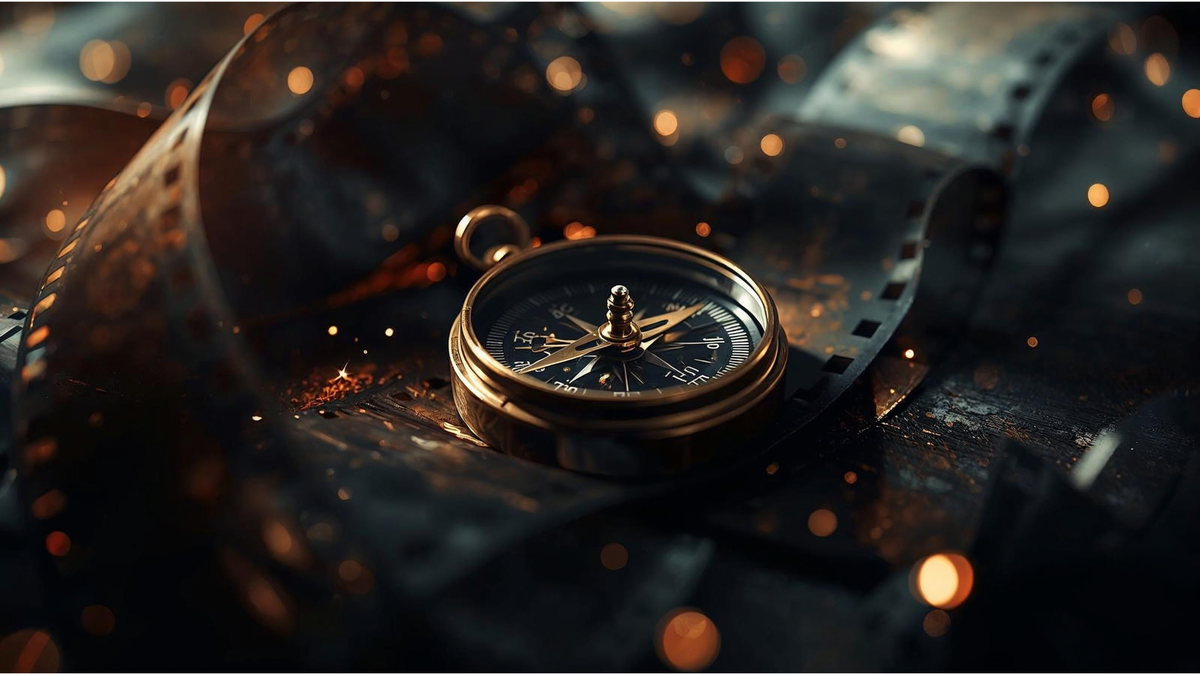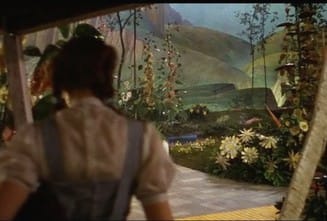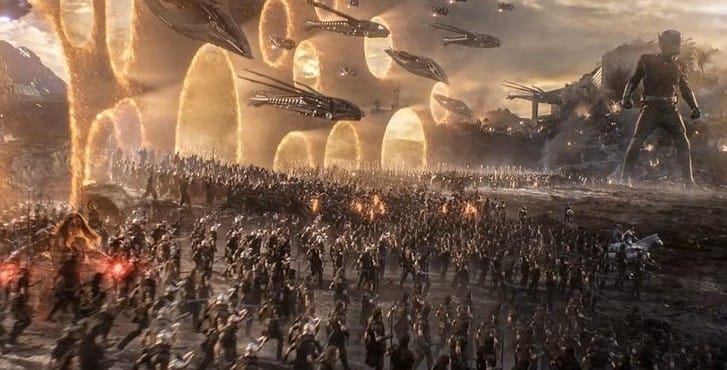Movies: Escape or Compass?
I grew up losing myself in movies thanks to my mother’s annual Wizard of Oz night. When I became a mother, our own tradition started with the MCU.

"You’ll be swell, you’ll be great, gonna have the whole world on a plate!”
Our old record player used to crackle out the voices of Merman, Streisand, and Garland. My mother used to sing, "Everything's Coming Up Roses" as if it were some sort of promise rather than a show tune, completely unfazed by the fact that our life didn't look anything like roses.
But that song became the refrain of my childhood as a reminder that somehow, things could always change. Movies, music, and stories were my first taste of magic and the easiest way to escape when I needed to.
As a child, you don't have much control over anything, so stories are where you first learn to believe things might still turn out better than okay. We don't really grow out of that; we just get very good at downplaying it as adults.
I don’t remember exactly when I first saw The Wizard of Oz, but I vividly remember the annual ritual: my mother ceremoniously wheeling the TV into my room, and us eating popcorn out of a giant metal mixing bowl (extra butter, of course) in my bed.
And when Dorothy stepped into glorious Technicolor? Sigh.
That was the moment I fell in love with movies.

There was a lot in my childhood that I couldn’t control, and movies were the only place in my life that didn't require hypervigilance.
That type of full-on, soul-gripping immersion still gets most of us good when a story really sticks the landing. Case in point: I recently sobbed through the second half of Me Before You (yes, I was late to the party on that one) while my family looked on with concern and secondhand embarrassment.
I know it's not exactly high art, so I wasn't expecting much when we cued it up. But there I was, crying over fictional people like their fictional choices affected me personally.
It was awesome.
My cinematic education was...eclectic, to say the least. I was singing show tunes before I was old enough to understand what I was singing about so enthusiastically.
I knew every word of, Dance: Ten, Looks: Three, before I even had boobs. I honestly thought When You're Good to Mama was just about helping with chores.
I was far too young to see Fame, A Chorus Line, and Staying Alive in theatres, but thanks to VHS, I got completely hooked. I couldn't get enough of the "big production" endings, especially Staying Alive. I so wanted to be Finola Hughes, even though I was Team Manero.
Those movies, and many others, taught me early on that success takes work, nothing is guaranteed, and sometimes, if you're lucky, the antagonist gets theirs.
Once I was old enough to actually sit in a theatre and pay attention, I experienced that shared energy of an audience reacting as one, something every filmmaker hopes to create.
For a long time, that kind of experience felt like common ground.
But now, too many films are judged on whether they’re “correct” or “responsible,” instead of whether they’re actually, you know...good.
And look, I get it - the world’s a hot mess, and I stay informed because I do care. But I think some pockets of the industry forget there's a fine line between moving an audience and lecturing them.
When I finally carve out two hours for a movie, nine times out of ten it's because I've had enough of the world and need that escape.
I’m not against messages. I’m just not keen on feeling like I'll be quizzed afterward. And I know I'm not the only one.
Years after my mother made Oz night our annual ritual, my daughter and I created one of our own. She was eight when Iron Man kicked off the MCU and already a superhero nerd, just like her mother.
At that age, I was wearing out VHS tapes of Superman, Raiders of the Lost Ark, and Star Wars. So, it became our thing, one movie, one post-credits scene at a time.
We collected memories like Infinity Stones. (Sorry, couldn't resist the metaphor.)
And then we got to Endgame.
Want the next one?
Opening weekend. Sold-out theater. The atmosphere was buzzing with anticipation and excitement that you could feel down to your bones.
For three hours, we all laughed at the inside jokes and basked in every full-circle moment. When Nat sacrificed herself for the Soul Stone, we were stunned into silence. When Mjölnir flew into Cap’s hand, the theatre absolutely erupted.
Then, that static crackle of "Cap, on your left"...chills.
Portals opened from Wakanda, Titan, New Asgard, the Sanctums, Kamar-Taj... One by one, the dead returned, and the crowd lost its collective mind.
When T’Challa yelled, “Yibambe!” we roared it back like we were all gonna throw down on Thanos. It was peak insanity in the best possible way.
And then:
“Avengers… assemble.”
Two little words signifying eleven years of storytelling, hitting their crescendo in one of the most epic moments in cinema history.

People were screaming and high-fiving total strangers. It was like the Super Bowl, a Comic-Con reveal, and a biblical rapture all in one.
(Too dramatic? Maybe, but not if you were there.)
That final battle scene was a masterclass in communal cinematic experience and payoff. It was huge and emotional, and it earned every second of the years invested to get there.
And then, this moment:

Oh, we were not ready. At all. One second, we were riding this glorious high of hard-won victory, and the next, Marvel bitch-slapped us with the single greatest loss in the MCU.
We'd grown up with this character. A decade of wisecracks, upgrades, close calls, bad decisions, and all the “I shouldn’t love him, but I absolutely do” moments.
Tony Stark had evolved from character to family, so when that awful, inevitable, beautifully executed moment came, the pain was damn near physical.
And then little Morgan said she wanted a cheeseburger at her father's funeral. My heart.
That's what great storytelling does. It builds you up, carries you along, and lets you get just comfortable enough before it knocks the very breath out of you.
And you love every minute of it, because that shared reaction is part of the magic. It's what turns rooms full of strangers into temporary little communities. Just like Comic-Con, that collective experience is a little addictive.
Years have passed, and plenty of us would give anything to experience that again for the first time.
And yes, I know it’s a big, nerdtastic, CGI superhero movie. But it was peak storytelling that cared about its characters and respected its audience.
For my daughter and me, it was also the end of a tradition. Our thing. And now it was over...or so I thought.
I am self-aware enough to see the silliness of rhapsodizing about a comic book movie. But great storytelling transcends genre, does it not?
I've been just as affected by Schindler's List, Children of Men, the D-Day landing in Saving Private Ryan, Artax sinking in The Neverending Story (hello, childhood trauma), Yondu's funeral, and the final scene of The Father.
The Father was a movie I've only seen once because once was more than enough for me to absorb it. I've provided hospice care three times in my life, and seeing that experience, and that devastating plot twist, reminded me just how precious time really is and why we shouldn't waste it.
Yondu's last words: “He may have been your father, boy, but he wasn’t your daddy,” were expertly written. It was an imperfect expression that showed exactly how Yondu loved his 'son' Quill in the only way he knew how, more than Quill ever knew, until it was too late.
Seeing that play out made me think about what I'd never had in my own life and inspired me to be more intentional with people I love while they're still with me.
This isn't exactly groundbreaking stuff; great stories have always done this.
Except Cats. That movie sucked.
What Endgame had that none of those films could give us was time. Eleven years of growing up together, inside jokes, dumb debates, and the gradual accumulation of shared history and everything that made us... us.
The post-Endgame years, however, were a whole different story, and I've already written about that.
That's why I'm excited for Fantastic Four and Doomsday. There's real talent here. Matt Shakman's involved, and the Russos are back in the game (thank God). If anyone can nail it, it's them.
I don't want perfection.
I want escape. I want inspiration.
I want to be cinematically bitch-slapped again.
If you'd like to support the work, here's where to do it.
If this made sense to you, subscribe. If it didn’t, maybe the next one will.
I am nothing if not versatile.
Related Reads
- I Know It’s Fiction, Shut Up — why people connect so strongly to stories and characters, even when they’re fictional.
- Stark Contrast — a direct look at what’s happening in the MCU and why fans feel the difference.
- Somewhere in Time — a reflection on nostalgia, storytelling, and the movies that stay with us.
Heather Papovich is the voice behind Unfinished Business, a weekly essay series where real life meets pop culture, and how to get through both without (mostly) losing it.




